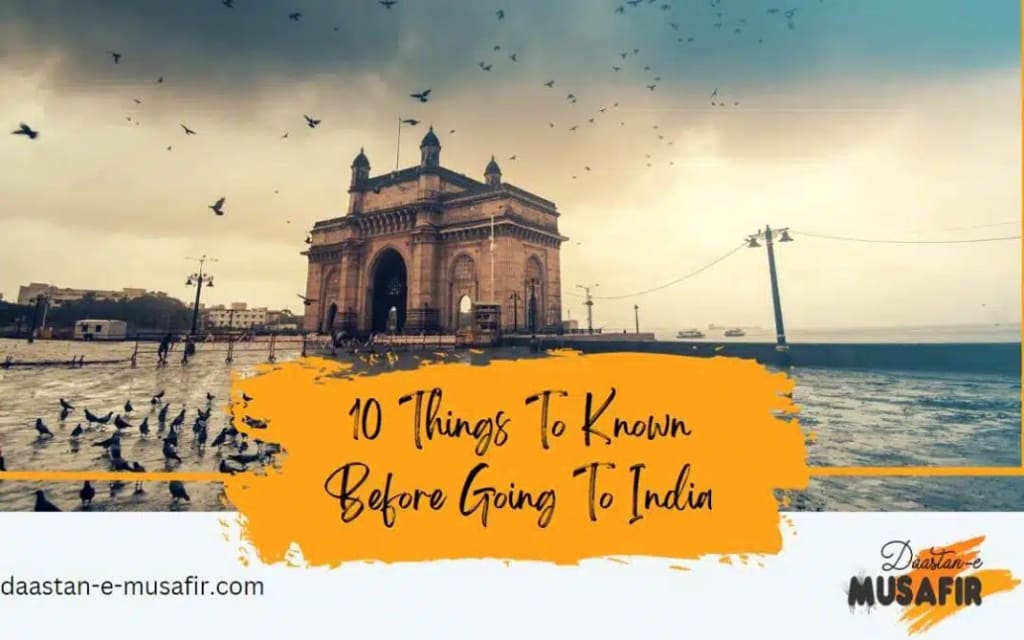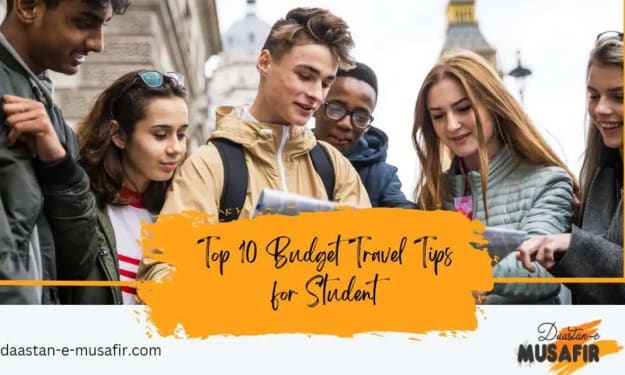10 Things To Known Before Going To India
10 Things To Known Before Going To India

10 Things To Known Before Going To India
Before traveling to India, there are several important things to keep in mind to ensure a smooth and enjoyable experience. Here are 10 key points to know before going to India:
Visa Requirements: Check the visa requirements for your country and apply well in advance. Make sure you have a valid passport with at least six months' validity remaining.
Vaccinations and Health Precautions: Visit a travel clinic or consult your doctor to get the necessary vaccinations, such as hepatitis A and B, typhoid, and tetanus. Take precautions against water and foodborne illnesses by drinking bottled water and eating at reputable establishments.
Cultural Sensitivity: India is a diverse country with various customs and traditions. Respect the local culture and dress modestly, especially when visiting religious sites. Learning a few basic Hindi phrases can also be helpful.
Weather and Appropriate Clothing: India experiences diverse climates, so pack according to the season and region you plan to visit. Lightweight and breathable clothing is generally suitable, but carry a shawl or scarf for covering your head or shoulders in religious places.
Transportation: India has an extensive transportation network, but traffic can be chaotic, especially in cities. Plan your travel and allow extra time for delays. Consider using prepaid taxis or ride-sharing apps for convenience and safety.
Currency and Cash: The official currency in India is the Indian Rupee (INR). Carry a mix of cash and cards, as some rural areas and smaller establishments may not accept cards. Inform your bank about your travel plans to avoid any card issues.
Safety and Security: India is generally safe for travelers, but it's essential to take precautions. Be cautious of pickpockets, especially in crowded areas. Avoid traveling alone late at night and use reputable transportation options.
Food and Water: Indian cuisine is diverse and flavorful. Try local delicacies, but be cautious about street food hygiene. Stick to bottled water and avoid ice cubes or uncooked vegetables and fruits that may have been washed in tap water.
Monuments and Sites: India is home to numerous historical monuments and UNESCO World Heritage sites. Research and plan your visits in advance, as some attractions require pre-booked tickets or have restricted entry timings.
Bargaining and Negotiating: Bargaining is a common practice in India, especially in markets and bazaars. Hone your negotiation skills, but always be respectful and fair in your dealings.
Remember, India is a vast and diverse country with a rich cultural heritage. Embrace the experience with an open mind and be prepared for an adventure that will leave you with lasting memories.
Is India stressful to travel?
Traveling in India can be a unique and exciting experience, but it can also be challenging and overwhelming for some travelers. The level of stress experienced during travel depends on individual preferences, adaptability, and prior travel experiences. Here are some factors that can contribute to the perceived stress of traveling in India:
Culture Shock: India has a rich and vibrant culture that may be vastly different from what you are accustomed to. The stark contrasts in customs, languages, and social norms can be overwhelming at first.
Crowds and Traffic: India's population is enormous, and cities can be crowded and chaotic. The bustling streets, traffic congestion, and constant honking can be overwhelming, especially if you're not accustomed to such environments.
Language Barrier: While English is widely spoken in urban areas, there can still be communication challenges, particularly in rural regions. It's helpful to learn a few basic Hindi phrases or carry a translation app to facilitate communication.
Hygiene and Sanitation: India has different standards of hygiene compared to some Western countries. Sanitary conditions can vary, especially in public areas and rural regions. It's essential to maintain good personal hygiene and take necessary precautions to avoid foodborne illnesses.
Infrastructure: Infrastructure can vary across different parts of India. While major cities have well-developed facilities, rural areas may have limited amenities. This can impact the ease of travel, availability of transportation, and access to modern conveniences.
Scams and Touts: Like any tourist destination, there can be instances of scams and touts targeting unsuspecting travelers. It's important to be vigilant, research common scams, and take necessary precautions to avoid falling victim to such situations.
Despite these potential stressors, many travelers find the experience of visiting India immensely rewarding and transformative. The key to managing stress is to plan and prepare well in advance, maintain a flexible mindset, and embrace the unique aspects of Indian culture. Being open to new experiences and having a sense of adventure can help mitigate any stress that may arise during your journey.
What should I know before Travelling?
Before traveling, it's important to be well-prepared and informed to ensure a smooth and enjoyable journey. Here are some essential things to know before traveling:
Destination Research: Learn about your destination, including its culture, customs, traditions, local laws, and any specific requirements or restrictions for travelers. Research popular attractions, transportation options, and local customs to have a better understanding of what to expect.
Travel Documents: Check the passport requirements for your destination and ensure your passport is valid for at least six months beyond your planned departure date. Research visa requirements and apply in advance if necessary. Make copies of important travel documents and keep them separate from the originals.
Health and Vaccinations: Visit a travel clinic or consult your doctor to determine if any vaccinations or medications are recommended for your destination. Research potential health risks, food and water safety, and take necessary precautions to stay healthy during your trip.
Travel Insurance: Consider purchasing travel insurance that covers medical emergencies, trip cancellation or interruption, and loss or theft of personal belongings. Review the policy coverage and ensure it meets your needs.
Transportation: Research transportation options at your destination, including flights, trains, buses, or rental cars. Familiarize yourself with local transportation systems, routes, and schedules. Book transportation tickets or make reservations in advance when necessary.
Accommodation: Research and book accommodations that suit your budget and preferences. Consider factors such as location, amenities, and safety. Read reviews from previous guests to get an idea of the quality and service provided.
Finances: Inform your bank or credit card company about your travel plans to avoid any issues with card usage abroad. Research the local currency, exchange rates, and ATM availability at your destination. Carry a mix of cash and cards for emergencies and convenience.
Safety and Security: Research the safety situation at your destination, including any travel advisories or warnings. Be aware of common scams or crimes targeting tourists and take necessary precautions to protect yourself and your belongings.
Local Customs and Etiquette: Learn about the local customs, traditions, and social etiquette of your destination. Respect the local culture, dress appropriately, and behave in a manner that is sensitive and considerate towards the local population.
Communication: Familiarize yourself with common phrases or greetings in the local language. Carry a phrasebook or translation app to facilitate communication, especially in areas where English may not be widely spoken.
Remember to pack appropriately for the climate and activities at your destination, inform your loved ones about your travel plans, and make copies of important documents. Being well-prepared and informed will help ensure a smoother and more enjoyable travel experience.
Is it a good idea to go to India?
Whether or not it is a good idea to go to India depends on various factors and personal preferences. India is a diverse and culturally rich country with a multitude of attractions, historical sites, vibrant festivals, and delicious cuisine. Many travelers find their experiences in India to be eye-opening, transformative, and rewarding.
Here are some factors to consider when deciding if India is a good destination for you:
Cultural Diversity: India's cultural diversity is vast, with a wide range of languages, traditions, religions, and customs. If you have an interest in immersing yourself in different cultures and experiencing new perspectives, India can be an excellent choice.
Historical and Architectural Marvels: India is home to numerous historical sites, such as the Taj Mahal, Jaipur's palaces, and the ancient caves of Ellora and Ajanta. If you appreciate history, art, and architecture, India offers a wealth of iconic landmarks and heritage sites.
Natural Beauty: India boasts diverse landscapes, from the stunning beaches of Goa and Kerala to the majestic Himalayan mountains and the tranquil backwaters of Kerala. Nature lovers can find ample opportunities for adventure, wildlife spotting, and rejuvenation in India.
Spiritual and Wellness Retreats: India has been a spiritual destination for centuries, attracting seekers of enlightenment and well-being. Places like Rishikesh, Varanasi, and Dharamshala offer opportunities for yoga, meditation, and spiritual exploration.
Culinary Delights: Indian cuisine is renowned worldwide for its rich flavors and diverse regional dishes. Food enthusiasts can indulge in a vast array of vegetarian and non-vegetarian options, street food delicacies, and traditional recipes that vary across different regions of the country.
However, it's important to note that India can also pose challenges for travelers. Factors such as crowded cities, traffic congestion, cultural differences, and hygiene standards may require adjustment and adaptation. It's crucial to do thorough research, plan your itinerary well, and take necessary precautions for a safe and enjoyable trip.
Ultimately, whether India is a good idea for you depends on your interests, willingness to embrace new experiences, and openness to navigating the unique aspects of the country. It can be a remarkable destination for those seeking an adventure, cultural immersion, and a deeper understanding of a diverse and vibrant nation.
What to do before your first trip?
Before your first trip, it's important to take care of several key tasks to ensure a smooth and enjoyable experience. Here are some essential things to do before embarking on your first trip:
Research Your Destination: Gather information about your destination, including its culture, attractions, local customs, safety considerations, and any visa requirements. Learn about the weather conditions during your travel dates to pack appropriately.
Plan Your Itinerary: Decide on the places you want to visit and create a rough itinerary. Research transportation options, accommodation, and popular attractions to make the most of your time at the destination.
Check Passport and Visa Requirements: Ensure your passport is valid for at least six months beyond your intended departure date. Check the visa requirements for your destination and apply in advance if necessary. Make copies of your passport and other important travel documents and keep them separate from the originals.
Get the Necessary Vaccinations: Visit a travel clinic or consult your doctor to determine if any vaccinations or medications are recommended for your destination. Start this process well in advance, as some vaccines may require multiple doses or take time to become effective.
Book Your Flights and Accommodation: Once you have a clear idea of your travel dates and itinerary, book your flights and accommodation. Compare prices, read reviews, and choose options that fit your budget and preferences. Consider booking flexible options in case of any changes or cancellations.
Purchase Travel Insurance: It's advisable to have travel insurance that covers medical emergencies, trip cancellation or interruption, and loss or theft of personal belongings. Review different insurance options and choose a policy that suits your needs.
Pack Smartly: Make a packing list based on the weather, activities, and duration of your trip. Pack essentials such as clothing, toiletries, electronics, adapters, and any medications you require. Consider weight restrictions for flights and be mindful of the items allowed in carry-on and checked baggage.
Inform Your Bank and Credit Card Companies: Let your bank and credit card companies know about your travel plans to avoid any issues with card usage abroad. Inquire about international transaction fees and consider carrying multiple payment options for convenience.
Secure Your Home: Ensure the safety of your home while you're away. Lock all doors and windows, set up timers for lights, and ask a trusted neighbor or friend to keep an eye on your property. Consider redirecting your mail or suspending newspaper deliveries.
Learn Basic Local Phrases: Familiarize yourself with a few basic phrases in the local language of your destination. Greetings, thank you, and simple questions can go a long way in facilitating communication and showing respect to locals.
Remember to have a positive and open mindset, embrace the unknown, and be prepared for unexpected situations. By taking care of these important tasks before your first trip, you'll be well-prepared to embark on a memorable journey.
How do I prepare myself for traveling?
Preparing yourself for traveling involves several key steps to ensure a smooth and enjoyable experience. Here are some essential ways to prepare yourself for your upcoming trip:
Research Your Destination: Gather information about your destination, including its culture, customs, local laws, weather conditions, and popular attractions. Familiarize yourself with the local customs, traditions, and etiquette to show respect and adapt better.
Plan Your Itinerary: Decide on the places you want to visit and create a detailed or rough itinerary. Research transportation options, accommodation, and local activities to make the most of your time at the destination. Consider any special events or festivals happening during your visit.
Check Travel Requirements: Check the passport and visa requirements for your destination. Ensure that your passport is valid for at least six months beyond your intended departure date. Apply for a visa if necessary, and make copies of your passport and other important travel documents.
Vaccinations and Health Considerations: Visit a travel clinic or consult your doctor to determine if any vaccinations or medications are recommended for your destination. Discuss any health concerns and obtain necessary prescriptions or medical documents. Purchase travel health insurance to cover any unexpected medical expenses.
Book Flights and Accommodation: Once you have a clear idea of your travel dates and itinerary, book your flights and accommodation. Compare prices, read reviews, and choose options that fit your budget and preferences. Consider booking flexible options in case of any changes or cancellations.
Pack Smartly: Make a packing list based on the weather, activities, and duration of your trip. Pack essential items such as clothing, toiletries, electronics, adapters, and any necessary medications. Be mindful of baggage restrictions and weight limits for flights.
Notify Banks and Credit Card Companies: Inform your bank and credit card companies about your travel plans to avoid any issues with card usage abroad. Inquire about international transaction fees and consider carrying multiple payment options for convenience.
Learn Basic Local Phrases: Learn a few basic phrases in the local language of your destination. Greetings, thank you, please, and simple questions can help you communicate with locals and show respect for their culture.
Secure Your Home: Take necessary measures to secure your home while you're away. Lock all doors and windows, set up timers for lights, and ask a trusted neighbor or friend to keep an eye on your property. Consider redirecting your mail or suspending newspaper deliveries.
Stay Informed: Stay updated on any travel advisories, safety concerns, or local news related to your destination. Sign up for travel alerts from your government's travel advisory website and stay connected with reliable sources of information.
Remember to pack a positive attitude, maintain flexibility, and be open to new experiences. By adequately preparing yourself for travel, you'll have a more enjoyable and stress-free journey.
About the Creator
daastanemusafir
https://daastan-e-musafir.com/






Comments
There are no comments for this story
Be the first to respond and start the conversation.